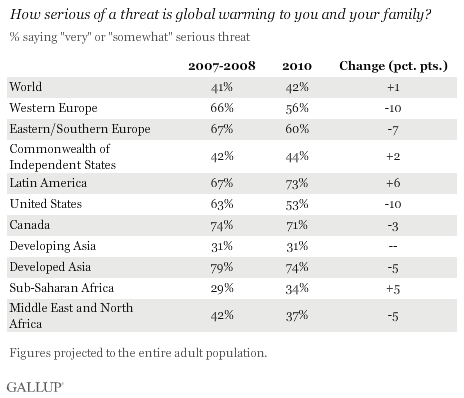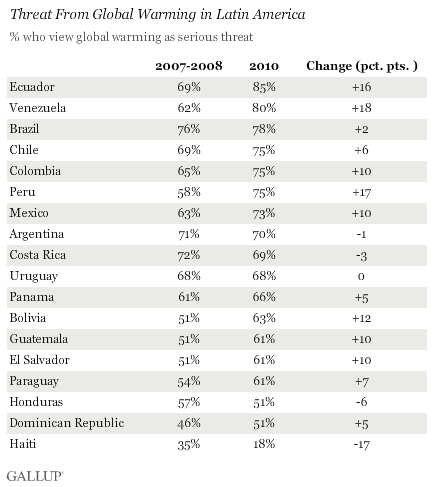WASHINGTON, D.C. -- Gallup surveys in 111 countries in 2010 find Americans and Europeans feeling substantially less threatened by climate change than they did a few years ago, while more Latin Americans and sub-Saharan Africans see themselves at risk.

The 42% of adults worldwide who see global warming as a threat to themselves and their families in 2010 hasn't budged in the last few years, but increases and declines evident in some regions reflect the divisions on climate change between the developed and developing world.
Majorities in developed countries that are key participants in the global climate debate continue to view global warming as a serious threat, but their concern is more subdued than it was in 2007-2008. In the U.S., a slim majority (53%) currently see it as a serious personal threat, down from 63% in previous years.
Concern about global warming has also declined across western, southern, and eastern Europe, and in several cases, even more precipitously than in the U.S. In France, for example, the percentage saying global warming is a serious threat fell from 75% in 2007-2008 to 59% in 2010. In the United Kingdom, ground zero for the climate data-fixing scandal known as Climategate in 2009, the percentage dropped from 69% to 57% in the same period.
World residents' declining concern about climate change may reflect increasing skepticism about global warming after Climategate and the lack of progress toward global climate policy. The drops also may reflect the poor economic times, during which Gallup research generally finds environmental issues become less important.
More Latin Americans, Sub-Saharan Africans See Danger
Latin Americans, who already were among the most aware of climate change and the most likely to view global warming as a personal threat, became even more aware and more concerned in 2010. Seventy-seven percent of Latin Americans claim to know at least something about climate change, and nearly as many see it as a personal threat (73%).
These relatively high figures among Latin Americans may be partly attributable to the bad rainy seasons and flooding that leaders in the region such as Venezuelan President Hugo Chavez have linked to global warming. Countries that were hit particularly hard by floods, such as Ecuador and Venezuela, saw residents' likelihood to view global warming as a threat surge in 2010.

In sub-Saharan Africa, where populations are likely to be vulnerable to the effects of climate change, awareness is still among the lowest in the world, but was up in 2010. Nearly half of the adult population in the region (46%) say they are aware of climate change, up from 38% in 2007-2008. Correspondingly, the percentage who perceive climate change as a serious threat increased slightly.
Implications
The feuding between rich and poor nations at climate talks in Bangkok in April demonstrates the obstacles that remain before the world can agree on a climate policy. Gallup's data show that fewer Americans and Europeans, whose nations are central players in these talks, feel threatened by global warming today than they did in recent years. However, majorities in many of these countries still see climate change as a serious threat, which means the issue remains personally important to them.
For full country results, see page 2.
For complete data sets or custom research from the more than 150 countries Gallup continually surveys, please contact SocialandEconomicAnalysis@gallup.com or call 202.715.3030.
Survey Methods
Results are based on face-to-face and telephone interviews conducted in 2010 with approximately 1,000 adults, aged 15 and older, in 111 countries. For results based on the total sample in each country, one can say with 95% confidence that the maximum margin of sampling error ranges from ±1.7 percentage points to ±5.7 percentage points. The margin of error reflects the influence of data weighting. In addition to sampling error, question wording and practical difficulties in conducting surveys can introduce error or bias into the findings of public opinion polls.


